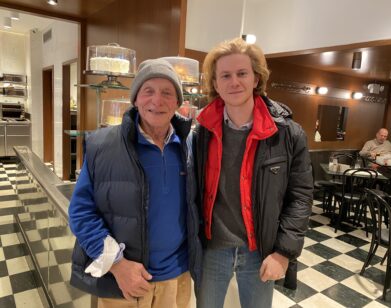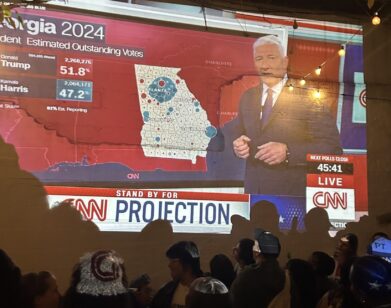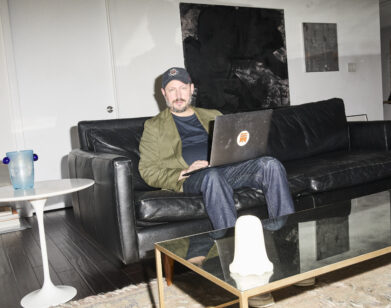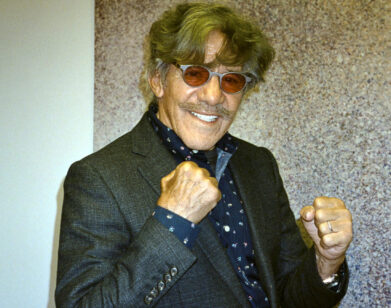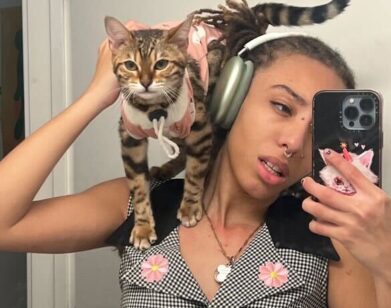snack time
Chef Carla Hall on Embracing Kindness in the Kitchen
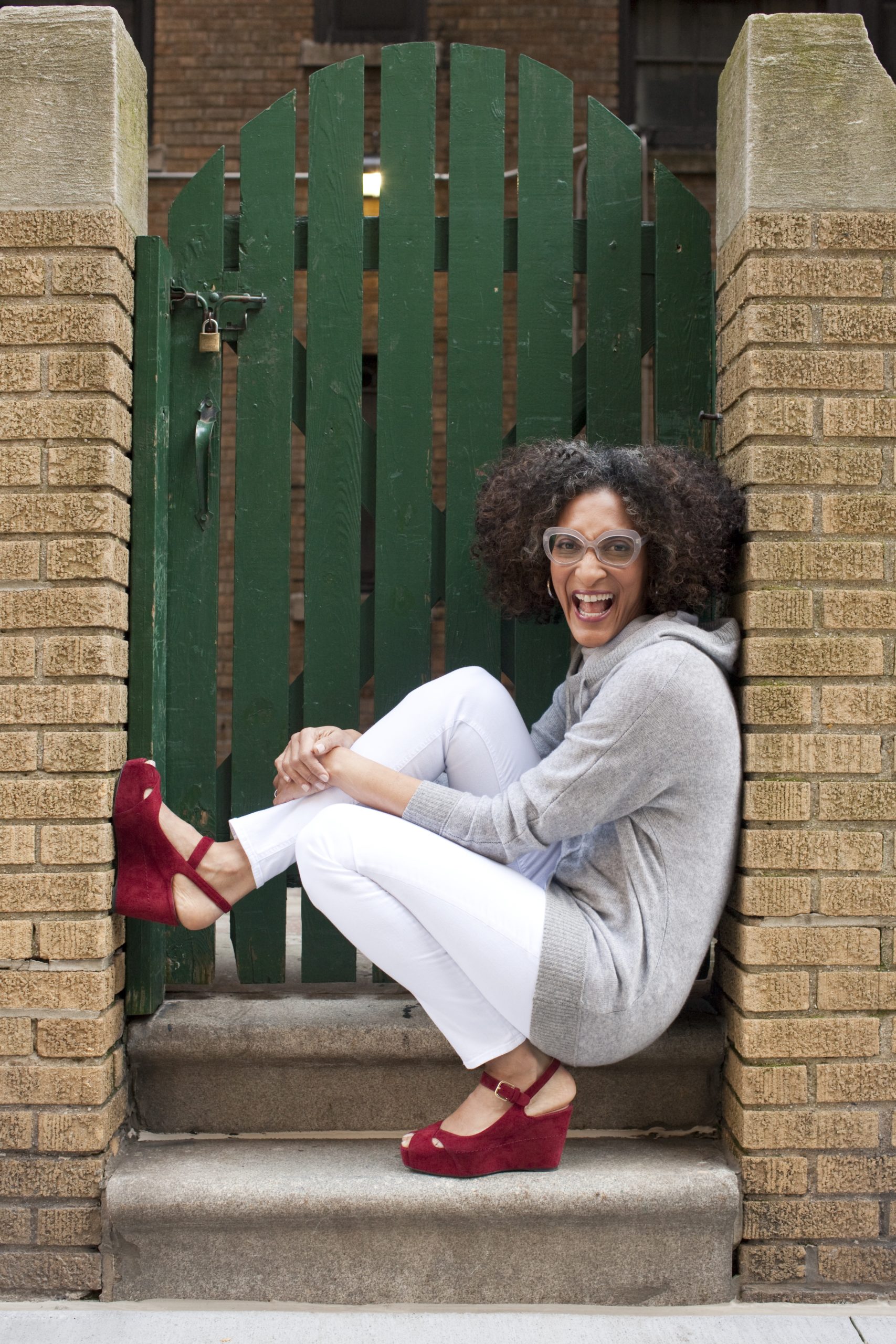
Carla Hall. Photos by Melissa Holm.
Many fans of the burgeoning culinary scene fell in love with Chef Carla Hall when she appeared on Bravo’s Top Chef, first in Season 5 and then later during the Season 8 “all-star” challenge. In a business dominated by obsessive, cutthroat behavior, Chef Carla stood out for her kindness and her philosophy of “cooking with love.” Since then, she has appeared on numerous other cooking shows like The Chew, written several cookbooks, and spread her positive spirit throughout the world of food. Though she’s known for her soul food and love of biscuits, for Chef Carla, food is about so much more than any single style or genre; it’s about nurturing the spirit, and the spirit of others. She believes that the emotions she’s feeling as she makes a particular dish infuse the food itself. In that way, to be negative while on the job is to offer a disservice to the diner. What a thought!
Chef Carla recently launched a new podcast, Say Yes! with Carla Hall, which features a wide range of guests, from master chefs like Rachael Ray to the comedian Chelsea Handler and the ballet dancer Misty Copeland. Hall will also be part of the Taste of the NFL program during this year’s Super Bowl weekend, a live-streamed event that raises funds for national hunger relief. We caught up with Hall to ask her about her love of food, what it’s like to see Vice President Kamala Harris take office, and much more.
———
JACOB UITTI: Why has food held your creative attention for this long?
CARLA HALL: Oh, that’s a great question! I think it’s because it’s always changing and you’re always learning. It’s held my attention specifically because my perspective changes. Initially, when I got involved in food, it was all about learning what I didn’t know based on what the people around me knew. I was like, “Wait, I’ve had this food all my life and you’re making it and you’re asking me what goes into it? I have no idea.” So, really, it was that curiosity and a little bit of ego to say, “Wait, I have to play catch-up.” Then it became this way of transitioning from one field to another, from modeling to something else. I didn’t know what that was going to be and I was willing to try it.
It also became a source of gratitude. I would cook for people who allowed me to couch surf. Then, just like with anything else, the more you do it, you actually get good at it. It was a way to nurture people. Then it became something to discover strengths about myself that I didn’t know I had. And then it became a job on television. After that, it really became a way to understand my culture more and really lean into the food of my culture. Even though I went to culinary school, I didn’t really find the connection to my culture at a French cooking school.
UITTI: What do your alma maters, Hillsboro High School [in Nashville] and Howard University, mean to you today?
HALL: Well, Hillsboro is, obviously, a connection to Nashville. Even though I don’t do much with the alumni association, I’m still friends with people who went to Hillsboro. And we talk about how Nashville has grown and changed. Over in Hillsboro Village, I’m like, “Oh my gosh!” I’ll be in Green Hills, I’m like, “My goodness!” And then, Howard University—right now, it’s huge! With Kamala Harris as the next Vice President of the United States, just spotlighting Howard and other HBCUs is really exciting.
UITTI: May I ask, what does Kamala Harris taking office this week mean to you?
HALL: I think that when you see someone in your culture get probably the second-most important seat in the country as a woman, as a Black woman, it is impactful because once you see somebody else who looks like you, it means you too can do it, that other young girls can do it. Growing up, I did not necessarily see myself on television or in the books that I read. It was such an effort in dolls, because I’m almost 60-years-old. I was born in ’64 and we didn’t see that. So, every single time I see a woman, a Black woman who looks like me, make strides in what may be considered mainstream America, it’s very joyous and confirming that we can dream really big.
UITTI: Nashville, where you’re from, is a music town, and D.C., where you live, is a political town. But how do you see the food scene in both of them?
HALL: Well, it’s interesting because I’m in Nashville right now. I do live in D.C, but we moved out of our home because of some major renovations, so we’re here with my mom. You know, I’ve watched both cities grow very much. And I think that for both cities—a lot of cities in the country—watching shows like Top Chef and Beat Bobby Flay and Chopped, you get to know a lot of local chefs, which helps the food scene in those smaller second- and third-tier cities because you want to support your local culinary heroes. Nashville has moved from a town that is about and known for music and not necessarily their food—I mean, people from Nashville knew about the meat-n-three, we knew about hot chicken. But to even put some of the foods on the national, even the world stage, is exciting. Some people are like, “Oh my gosh, they’re taking our dish.” But I’m like, “No, they’re sharing it.” Because once something makes it outside of the walls of your city, your city becomes bigger and you’re sharing it and then you get the influence. I look at that kind of sharing as very different as long as you give credit to where you got the information.
Yes, D.C. is political. But I also think that people forget that there are 700,000 people who live in D.C. We don’t look at it as a political town that changes every four years. We live there. So, the food scene has changed from your dark room steak places that maybe people in politics would go to to wheel and deal with lobbyists. It’s really nice to see more restaurants that are on the lower end of things, a sort of mid-range. You’re starting to fill in some of those gaps where food is accessible to everybody.
UITTI: How can Black American culture be better reflected in restaurants today?
HALL: Just a small question! I think that it starts with hiring. I am into Southern food. I’m also into the foods of our diaspora from Africa. But Blacks aren’t a monolith, you know? I mean, you have Black chefs who are interested in Asian cuisine. You have Blacks who are interested in Indian food and Mexican food. So, when somebody says, “I don’t see you reflected,” a lot of times people outside of a particular culture want to put people in that culture that they want to see more of in a box.
I personally think that I would love for people to see more of the African diaspora in our food and with nuances of other cultures because it, too, is American food. But not to get it so tight in a box where you’re like, “It’s soul food or nothing.” Because that’s not fair to the people of that culture. It would be like if you said, “Oh it’s fried rice or nothing.” So, I think that the more opportunity these chefs they have to speak to people in the media to actually share their perspective, the more things will change. Because it’s one thing to change it in one restaurant, but it’s another thing to actually get the word out and talk about those changes and that chef’s perspective.
UITTI: You rose to fame on Top Chef. What was your favorite small, perhaps unnoticed, moment from the show?
HALL: The camaraderie with the chefs. You’re always going to connect with somebody. I just spot to Ariane Duarte, who was on my season, the other day. I’m a few years older than she is, but because we were the oldest contestants, we came together and shared a perspective. I don’t know if people really noticed the camaraderie that we ha. Because you are away from home, you are sequestered, you don’t get to make phone calls to home. So, those relationships, even if they seem temporary at the time, are really important. We helped each other get through a lot of the challenges of Top Chef.
You also don’t see the nerves of other people. Sometimes when people are stressed, it comes out in different ways. Everybody always had to go to the bathroom as soon as they said, “Okay, we’re going to get ready to have the challenge.” Because of the nerves! Oh my gosh! The other thing that you don’t see is that we would taste each other’s food afterwards. So, even though the judges had their perspective of what the best dish was, we also had ours! Like, “Hmm, you really like that? Okay.” [Laughs.] I loved having blind tasting. I think one of the most surprising times, and I don’t know if they showed this, was Season 8 for All-Stars in the finale, it was Richard Blais and Mike Isabella and they had to choose their sous chefs based on blind tasting for a small dish. Even though they had an idea of who they wanted to choose, the food made the final decision. I don’t think they got who they thought they were going to get.
UITTI: What is “oil pulling,” why is it controversial, and why do you do it?
HALL: I do it occasionally. I don’t do it as much as I used to, but oil pulling is the act of actually taking coconut oil and swishing it in your mouth. Because coconut oil is an anti-microbial, it pulls some of the toxins out of your mouth, which we hold in our gums and in our mouths. It’s also really good for people—well, I think—it has helped me if I’ve had some kind of sinus congestion. That act of swishing for 20 minutes usually helps me drain my sinuses and any mucus that’s in my system. I don’t know why it’s so controversial!
UITTI: Because it’s cheap, probably.
HALL: Yeah! [Laughs.]
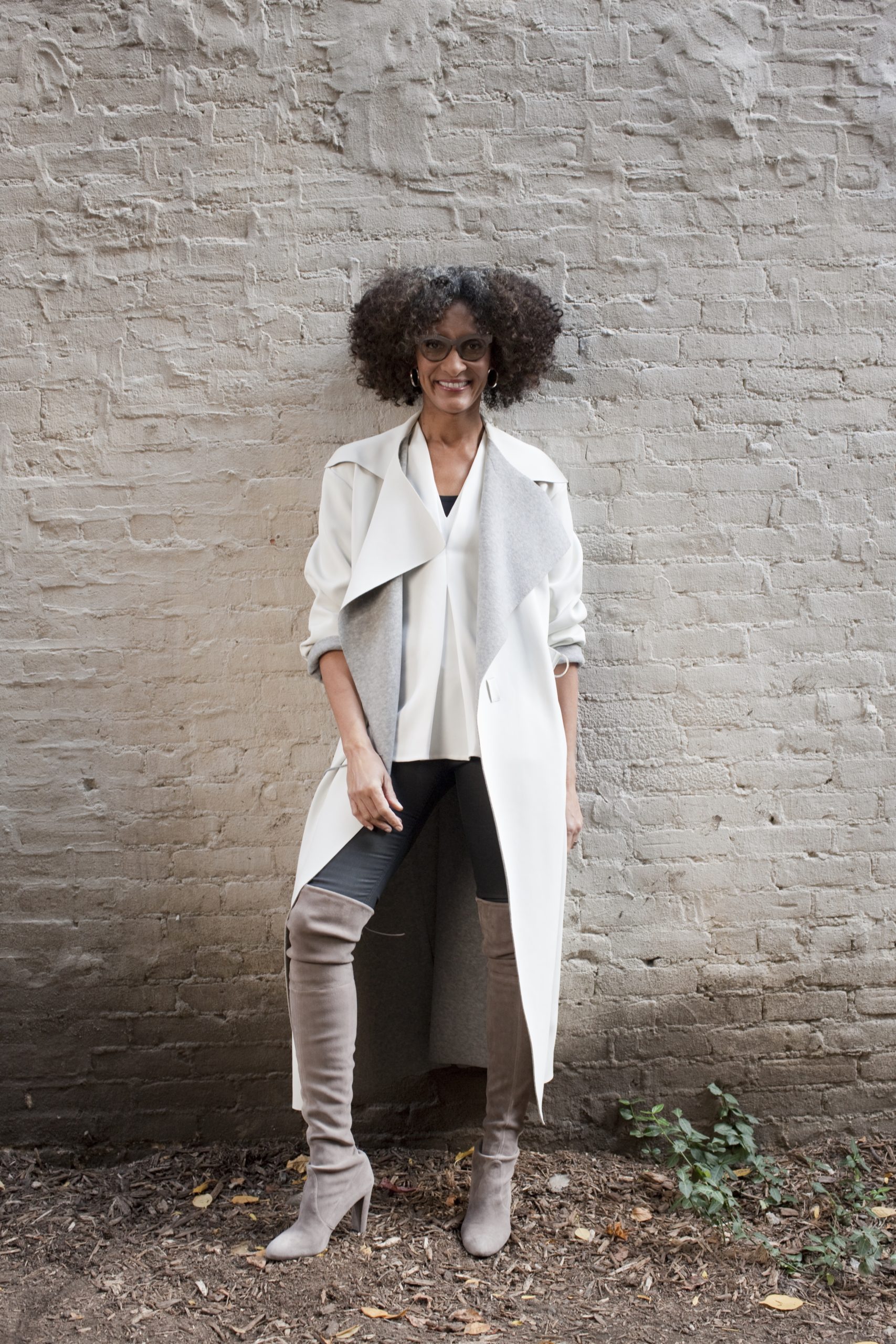
UITTI: I’ve worked in restaurants for many years in my life, and I know that chefs can have a reputation of being surly and very focused. There’s a sense almost that chefs can be “on the spectrum” with the amount of attention to detail that’s required. They can be hard nuts to crack, so to speak. But you’re often a more congenial, friendly person. Do you have any tricks for breaking the professional ice?
HALL: Oh, I really feel that, I mean, cooking is a way for me to nurture other people. I truly believe that whatever emotion I have goes into the food. That said, when you talk about chefs being on the spectrum—I had a conversation with Duff Goldman about this. I interviewed him on my podcast. I think we are a little obsessive over one thing and we just keep focusing on that one thing. We want to get it right. And I do have that. But I also believe that every chef has their perspective, which is like having an opinion. Everybody has one. That should not be squashed. It’s a balance, though. When I judge food on food television, I always want to be constructive, so if that person goes home, they’re going home with more information than they came in with. Because, as a person who has competed, that’s what I want. I remember Padma [Lakshmi] had come to The Chew as a guest, and she said, “The one thing that I noticed about you, Carla, whenever we gave you feedback at the judge’s table, you always put that feedback into your food the next time.” That is the biggest gift. At the end of the day, it’s just food! It’s not that serious! It should be a way that we’re coming together and not tearing each other apart.
UITTI: It’s funny how that happens in so many endeavors. We get comfortable and then we get mean.
HALL: Yeah, I really think that that’s part of the stress that you’re seeing. I mean, look at police officers, they have very stressful jobs and they come home and they take it out on their family, you know? I really try to understand where someone is coming from. I remember [Top Chef contestant] Marcel [Vigneron]. I just saw him as somebody who wanted to be heard. I think a lot of people looked at him as somebody who would have these tantrums. But I looked at it like he was still really young. He had to work stuff out. That was the benefit of me being older, as well, having the maturity where you can look at these people who seem to be acting out and you’re like, “Okay, they’re going to get over that.” I didn’t really take it personally. You don’t see that on Iron Chef and on those Top Chef Masters with the professionals.
UITTI: Yeah, they don’t care.
HALL: They’re older. Their ego wasn’t in that dish. And they were established. They knew what they knew. And they’re like, “This show isn’t going to break me.”
UITTI: The next event you’re doing is the “Taste of the NFL” during Super Bowl weekend. What do you like to make for the Super Bowl?
HALL: If I go to a Super Bowl party, it’s all about the food. I don’t really care about the game. I’m usually rooting for the people with the ball! My husband hates when I say that. But it’s all about the food. It’s a day for indulgence in terms of cheese and fat and salt [Laughs]. So, that I absolutely love. And for the Taste of the NFL, I’m going to be doing a couple dishes. I’ll be doing some meatballs. I’ll be doing some biscuits with pimento cheese. Snacky stuff, things that make you happy when you look at the commercials. You see the Doritos commercials and all the Pepsi products. It’s like going to movies and getting your popcorn and your candy and soda. It’s going to a really great cause and I think we’ll have a lot of fun making people aware of this issue and also just not allowing the pandemic to squash the fun that you can still have with your food on Super Bowl Sunday.
UITTI: What is something you said “yes” to that you almost didn’t but that ended up changing your life?
HALL: There are a lot of things, actually. I said “no” to doing Top Chef All-Stars, like, twice. And then the producers came back to me and said, “Let’s do it!” Even my PR team was like, “You should say no because you’re just getting to the point where you have your own brand.” Then I ended up saying “yes,” and then there we go, I made it to the finale. Even doing The Chew was almost a “no” because I had to move and live in New York. I was prepared to not take it because we had to make that kind of a decision as a couple. I would be living in New York during the week and going home on the weekends.
Even when I went to Howard University—I didn’t want to go to Howard. My sister was going to go to Howard and I said, “No, I don’t want to go there.” I was going to go to Boston University and major in theater. And when I was rejected from Boston University, because my sister was going to Howard, I said, “Okay, I’ll just apply and go there.” I ended up applying later, and that completely changed my life.

